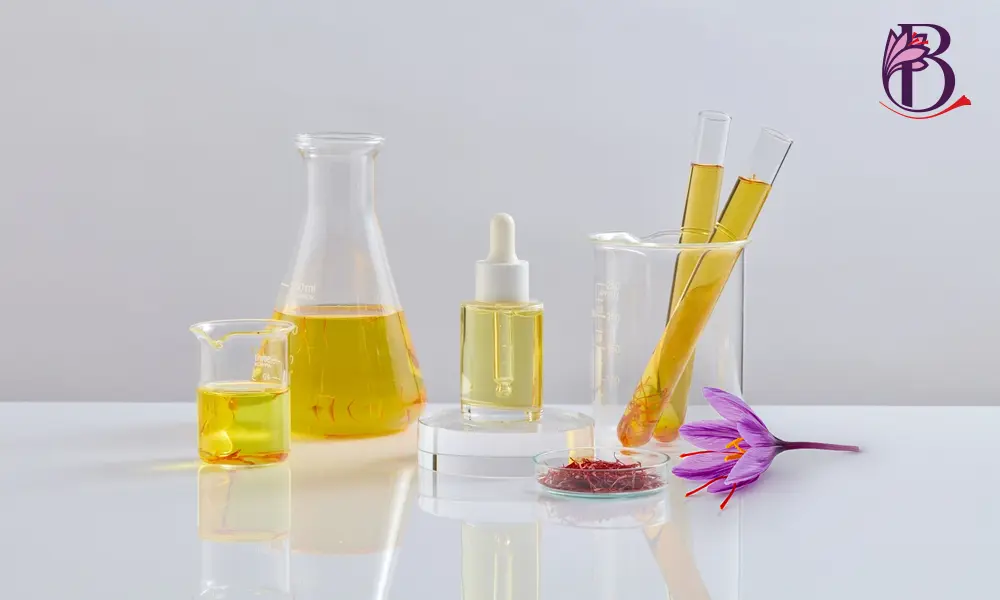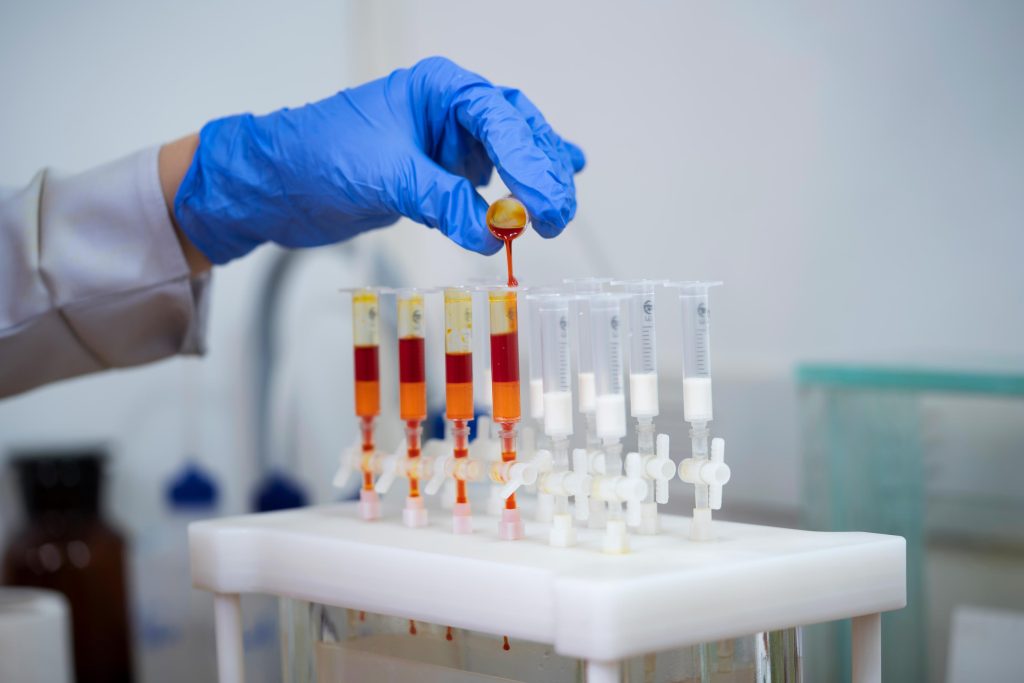SAFFRON: AN EXPENSIVE SPICE WITH DIVERSE USES
Saffron, a precious and aromatic spice derived from the stigma of the saffron crocus flower, has been used for centuries in cooking, traditional medicine, and various industries. The unique taste and aroma of saffron are due to the presence of various plant compounds including crocin, crocetin, and safranal.
)Safranal is a chemical compound found in saffron and is responsible for its unique aroma and flavor. This compound is primarily an aldehyde that creates the distinctive and pleasant smell of saffron. Safranal is produced during the extraction of saffron from its flowers and is recognized as one of the most important compounds in saffron, particularly concerning its natural and beneficial properties.
Safranal is also known as an antioxidant compound that can contribute to overall body health and help prevent oxidative damage. Additionally, some research suggests that safranal may have anti-inflammatory and anti-cancer properties, but further studies are needed to determine its exact effects on human health.(
In this article, we will explore the various uses of saffron:

cooking:
Saffron is one of the most beloved spices in Middle Eastern, South Asian, and European cuisine. It is used to flavor a wide range of dishes including rice, paella, stews, soups, desserts, and beverages. Saffron is also used as a natural food colorant, imparting a beautiful golden-yellow hue to dishes.
Some popular dishes with saffron include:
- Saffron Rice: Saffron plays a fundamental role in cooking saffron rice, one of the most famous Iranian dishes. Saffron-infused rice, with its unique aroma and flavor, is served as the main dish at ceremonies and celebrations.
- Saffron Chicken: Saffron chicken is a popular dish in Iranian cuisine where chicken is cooked with saffron, onions, and other spices. Saffron adds an extraordinary taste and aroma to this dish, making it a delightful meal.
- Saffron Halva: Saffron halva is a traditional Iranian dessert made from flour, saffron, sugar, rosewater, and oil. Saffron gives this dessert a unique taste and aroma, making it a popular choice for gatherings and occasions.
- Saffron Risotto: Saffron risotto is an Italian dish made with rice, saffron, Parmesan cheese, and broth. Saffron imparts a delicate flavor and aroma to this dish, turning it into a delicious and comforting meal.
• Saffron Paella: Saffron paella is a Spanish dish made with rice, saffron, seafood, chicken, and vegetables. Saffron adds an extraordinary taste and aroma to this dish, making it a popular dish worldwide.

Traditional Medicine
Saffron has a long history of use in traditional medicine. It is utilized to treat a wide spectrum of ailments including depression, anxiety, insomnia, digestive issues, and menstrual pain. Some research suggests that saffron may offer other health benefits such as improved cognitive function, eye health protection, and inflammation reduction.
Health Benefits of Saffron:
1. Mood Enhancement:
Saffron acts as a natural antidepressant and aids in increasing serotonin levels in the brain. Serotonin is a neurotransmitter that plays a crucial role in mood regulation.
Mechanism:
- Saffron contains compounds like crocin and safranal which may help increase serotonin production in the brain.
- Serotonin helps regulate mood, sleep, and appetite.
- Low serotonin levels can lead to depression, anxiety, and insomnia.
Scientific Research:
- Multiple studies have shown that saffron consumption can significantly reduce depressive symptoms in individuals with mild to moderate depression.
- One study demonstrated that consuming 30 milligrams of saffron per day for 6 weeks was as effective as fluoxetine (an antidepressant medication) in reducing depressive symptoms.
- Other studies have shown that saffron can help reduce anxiety and improve sleep quality in individuals with anxiety disorders.
2. Memory Enhancement:
Saffron possesses strong antioxidant properties that can protect brain cells from damage.
Mechanism:
- Free radicals are unstable molecules that can damage brain cells.
- The antioxidants present in saffron can neutralize free radicals and protect brain cells from damage.
- Brain cell damage is one of the primary factors in cognitive decline and Alzheimer’s disease.
Scientific Research:
- Animal studies have shown that saffron can improve memory and learning in mice and rats.
- A human study demonstrated that consuming 40 milligrams of saffron per day for 12 weeks significantly improved memory function in elderly individuals with mild to moderate cognitive impairment.
- Other studies have shown that saffron can help improve cognitive function in individuals with Alzheimer’s disease.
3.Pain Reduction:
Saffron possesses potent anti-inflammatory properties that can help reduce pain, including menstrual pain and joint pain.
Mechanism:
- Inflammation is a major factor in pain.
- The anti-inflammatory properties of saffron can help reduce inflammation in the body and consequently alleviate pain.
- Menstrual pain and joint pain are two common types of pain associated with inflammation.
Scientific Research:
- Multiple studies have shown that saffron consumption can significantly reduce menstrual pain in women with dysmenorrhea (severe menstrual pain).
- One study demonstrated that consuming 20 milligrams of saffron per day for 3 days was as effective as ibuprofen (a pain reliever) in reducing menstrual pain.
- Other studies have shown that saffron can help reduce joint pain in individuals with rheumatoid arthritis.
4.Eye Health Improvement:
Saffron contains carotenoids that can protect eye health and prevent age-related eye diseases such as macular degeneration.
Mechanism:
- Carotenoids are antioxidants that can protect eye cells from damage caused by sunlight and free radicals.
- Macular degeneration is an eye disease that can lead to vision loss.
Scientific Research:
- Multiple studies have shown that saffron consumption can improve vision in individuals with age-related macular degeneration.
- One study demonstrated that consuming 20 milligrams of saffron per day for 6 months significantly improved vision in individuals with age-related macular degeneration.
5.Immune System Boost:
Saffron possesses potent antioxidant properties that can help boost the body’s immune system and fight infections.
Mechanism:
- The body’s immune system is its defense line against infections.
- The antioxidants present in saffron can neutralize harmful free radicals and protect the body’s immune system from damage.
- Free radicals can weaken the body’s immune system and make it more susceptible to infections.
Scientific Research:
- Animal studies have shown that saffron can help boost the body’s immune system in mice and rats.
- A human study demonstrated that consuming 50 milligrams of saffron per day for 4 weeks significantly improved immune system function in individuals with recurrent colds.
- Other studies have shown that saffron can help in faster recovery from infections.
6.Blood Pressure Reduction:
Saffron can help reduce high blood pressure.
Mechanism:
- High blood pressure is the force of blood against the walls of arteries.
- High blood pressure can damage blood vessels and increase the risk of heart diseases and strokes.
- Saffron can help relax blood vessels and improve blood flow, which can help reduce blood pressure.
Scientific Research:
- Multiple studies have shown that saffron consumption can significantly reduce systolic and diastolic blood pressure in individuals with high blood pressure.
- One study demonstrated that consuming 30 milligrams of saffron per day for 8 weeks was as effective as lisinopril (a blood pressure-lowering medication) in reducing blood pressure.
- Other studies have shown that saffron can help reduce the risk of heart diseases and strokes in individuals with high blood pressure.
7.Heart Health Improvement:
Saffron can help improve heart health.
Mechanism:
- Saffron can help reduce LDL (bad) cholesterol and increase HDL (good) cholesterol.
- LDL cholesterol can damage blood vessels and increase the risk of heart diseases.
- HDL cholesterol can help remove LDL cholesterol from the body.
- Saffron can also help improve the function of blood vessels.
Scientific Research:
- Multiple studies have shown that saffron consumption can significantly reduce LDL cholesterol levels in individuals with high cholesterol.
- One study demonstrated that consuming 50 milligrams of saffron per day for 12 weeks was as effective as simvastatin (a cholesterol-lowering medication) in reducing LDL cholesterol levels.
- Other studies have shown that saffron can help improve blood vessel function and reduce the risk of heart diseases in individuals with heart disease.
8.Enhancement of Sexual Desire:
Saffron can help enhance sexual desire in both women and men.
Mechanism:
- The exact mechanism of saffron’s effect on sexual desire is not fully understood.
- Some research suggests that saffron can help increase levels of sex hormones such as testosterone and estradiol.
- Sex hormones play a crucial role in sexual desire.
- Saffron can also help improve blood flow to the reproductive organs, which can enhance sexual desire and performance.
Scientific Research:
- Multiple studies have shown that saffron consumption can significantly increase sexual desire in women and men with sexual dysfunction.
- One study demonstrated that consuming 30 milligrams of saffron per day for 4 weeks was as effective as sildenafil (a medication for enhancing sexual desire) in increasing sexual desire in men with erectile dysfunction.
- PMS (Premenstrual Syndrome) Symptoms Reduction:
Saffron can help reduce symptoms of premenstrual syndrome (PMS) in women.
Mechanism:
The exact reason for saffron’s effect on PMS symptoms is not fully understood, but several theories exist:
* Regulation of mood swings: Saffron may help regulate neurotransmitters like serotonin that play a role in mood regulation.
* Reduction of inflammation: The anti-inflammatory properties of saffron may help reduce inflammation associated with hormonal changes before menstruation.
* Reduction of oxidative stress: The antioxidants present in saffron can neutralize harmful free radicals and protect cells from damage. Oxidative stress may play a role in causing PMS symptoms.
Scientific Research:
Multiple studies have shown that saffron consumption can significantly reduce symptoms such as mood swings, bloating, abdominal pain, and headaches in women with PMS.
One study showed that consuming 30 milligrams of saffron per day for 7 days before menstruation was as effective as mefenamic acid (a pain reliever) in reducing menstrual pain associated with PMS.
Other studies have shown that saffron can help reduce other PMS symptoms such as mood swings, bloating, and anxiety.
* Improvement of Sleep Quality:
Saffron can help improve sleep quality.
Mechanism:
Saffron has relaxing properties that can help reduce anxiety and stress and induce deep sleep.
The exact mechanism of saffron’s effect on sleep is not fully understood, but it may be associated with increasing levels of the neurotransmitter gamma-aminobutyric acid (GABA) in the brain. GABA is a chemical in the brain that promotes relaxation and sleep.
Scientific Research:
Some studies have shown that saffron consumption can help improve sleep quality in individuals with insomnia.
One study demonstrated that consuming 30 milligrams of saffron per day for 6 weeks was as effective as zolpidem (a sleep aid medication) in improving sleep quality in individuals with mild to moderate insomnia.
More studies are needed to confirm the effects of saffron on improving sleep.
Important Points:
– Saffron is a precious and potent spice, so it should be used sparingly. The recommended dosage for benefiting from the health benefits of saffron varies depending on individual circumstances and needs. Consult with your doctor about the appropriate dosage for you.
– Pregnant and nursing women should consult their doctor before consuming saffron. Saffron may cause side effects in higher doses.
– Individuals with certain conditions such as diabetes and kidney diseases should consult their doctor before consuming saffron. Saffron may interact with certain medications.
Conclusion:
Saffron is a valuable and unique spice with a wide range of health benefits. This spice can contribute to improving mood, enhancing memory, reducing pain, improving eye health, boosting the immune system, and more. By consuming saffron regularly and in moderation, you can benefit from its numerous health advantages.
Note: This information is provided for informational purposes only and should not be considered a substitute for medical advice. For any health-related questions or concerns, please consult with a physician or healthcare professional.

Pharmaceutical Industry:
Saffron has a long history of use in traditional medicine and is utilized to treat a wide range of illnesses.
– Benefits of Saffron in the Pharmaceutical Industry:
– It possesses antidepressant and anti-anxiety properties.
– It can aid in improving sleep quality.
– It has anti-inflammatory and pain-relieving properties.
– It can help enhance cognitive function.
– It can contribute to eye health protection.
– Applications of Saffron in the Pharmaceutical Industry:
– Dietary supplements: Saffron capsules, saffron tablets, saffron syrup.
– Herbal medicines: Used for treating depression, anxiety, insomnia, and digestive issues.
– Topical products: Used for joint pain relief, arthritis, and skin problems.
– Important Notes:
– Saffron may interact with certain medications, so consult your doctor before use.
– Pregnant and nursing women should consult their doctor before consuming saffron.
– Individuals with certain diseases like diabetes and kidney diseases should consult their doctor before using saffron.

Textile Industry:
Saffron is used as a natural dye in the textile industry due to its beautiful and vibrant yellow-orange color.
– Benefits of Saffron in the Textile Industry:
– It imparts a durable and stable color to fibers.
– It softens and smoothens fibers.
– It possesses antimicrobial properties.
– Applications of Saffron in the Textile Industry:
– Dyeing silk, wool, and cotton fibers: Used for producing traditional and luxurious fabrics.
– Printing and patterning: Creating designs and patterns on fabrics.
– Important Notes:
– Saffron has strong coloring properties, so it should be used with caution.
– Saffron may damage certain synthetic fibers.

Cosmetic Industry (continued):
– Benefits of Saffron in the Cosmetic Industry:
– It helps moisturize the skin.
– It reduces inflammation and redness of the skin.
– It aids in wound healing and acne reduction.
– Applications of Saffron in the Cosmetic Industry:
– Sunscreen creams: Protecting the skin from UV rays.
– Moisturizing creams: Hydrating and nourishing the skin.
– Anti-aging products: Reducing wrinkles and fine lines.
– Soaps and cleansers: Cleansing and brightening the skin.
– Face masks: Hydrating, nourishing, and brightening the skin.
– Important Notes:
– Saffron may cause allergies for some individuals, so perform a sensitivity test before using saffron-containing products.
– Store saffron in a cool, dry place away from light.
Conclusion:
Saffron is a unique spice with a wide range of applications in various industries. Due to its unmatched aroma, beautiful color, and numerous health benefits, saffron is considered a valuable ingredient in the food, pharmaceutical, textile, and cosmetic industries.














